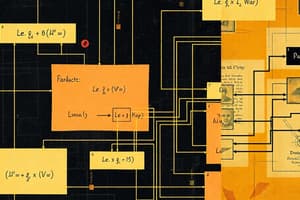Podcast
Questions and Answers
What is the negation of p?
What is the negation of p?
- p ∨ q
- p ∧ q
- p → q
- ~p (correct)
What is the logical conjunction of p and q?
What is the logical conjunction of p and q?
p ∧ q
What does p ∨ q represent?
What does p ∨ q represent?
Disjunction: p OR q
What does p → q mean?
What does p → q mean?
What is the biconditional of p and q?
What is the biconditional of p and q?
What does p => q signify?
What does p => q signify?
What is the converse of the implication p → q?
What is the converse of the implication p → q?
What does ~p → ~q signify?
What does ~p → ~q signify?
What is the contrapositive of p → q?
What is the contrapositive of p → q?
What is a Tautology?
What is a Tautology?
What is a Contradiction?
What is a Contradiction?
What does ∀x represent?
What does ∀x represent?
What does ∃x mean?
What does ∃x mean?
Flashcards
Negation of p
Negation of p
The opposite of statement p
p ∧ q
p ∧ q
Both p and q are true
p ∨ q
p ∨ q
Either p or q (or both) is true
p → q
p → q
Signup and view all the flashcards
p ↔ q
p ↔ q
Signup and view all the flashcards
p => q
p => q
Signup and view all the flashcards
Converse of p → q
Converse of p → q
Signup and view all the flashcards
~p → ~q
~p → ~q
Signup and view all the flashcards
Contrapositive of p → q
Contrapositive of p → q
Signup and view all the flashcards
Tautology
Tautology
Signup and view all the flashcards
Contradiction
Contradiction
Signup and view all the flashcards
∀x
∀x
Signup and view all the flashcards
∃x
∃x
Signup and view all the flashcards
Study Notes
Logic Symbols and Their Definitions
-
Negation (~p): Represents the inverse of proposition p, indicating that p is not true.
-
Conjunction (p ∧ q): A logical operator indicating that both propositions p and q must be true.
-
Disjunction (p ∨ q): Refers to either proposition p or proposition q being true, allowing for both to be true simultaneously.
-
Implication (p → q): Establishes a conditional relationship where the truth of p guarantees the truth of q, noted as "if p, then q."
-
Biconditional (p ↔ q): Signifies that both propositions p and q are logically equivalent; they are either both true or both false.
-
Logical Implication (p => q): Similar to implication, asserting that if proposition p holds true, then proposition q must also be true.
-
Converse (q → p): The reversal of the original implication, where q implies p. Its truth value may differ from the original implication.
-
Inverse (~p → ~q): Represents the negation of both propositions from the original implication, indicating that if p is false, then q must also be false.
-
Contrapositive (~q → ~p): The negation and reversal of implication, where if q is false, p must also be false; inherently equivalent to the original implication.
-
Tautology: A proposition that is always true regardless of the truth values of its constituent parts.
-
Contradiction: A proposition that is always false, no matter the truth values assigned to its components.
-
Universal Quantifier (∀x): Indicates that a statement applies to all elements x in a given set.
-
Existential Quantifier (∃x): Indicates that there exists at least one element x in a set that satisfies a given condition.
Studying That Suits You
Use AI to generate personalized quizzes and flashcards to suit your learning preferences.




